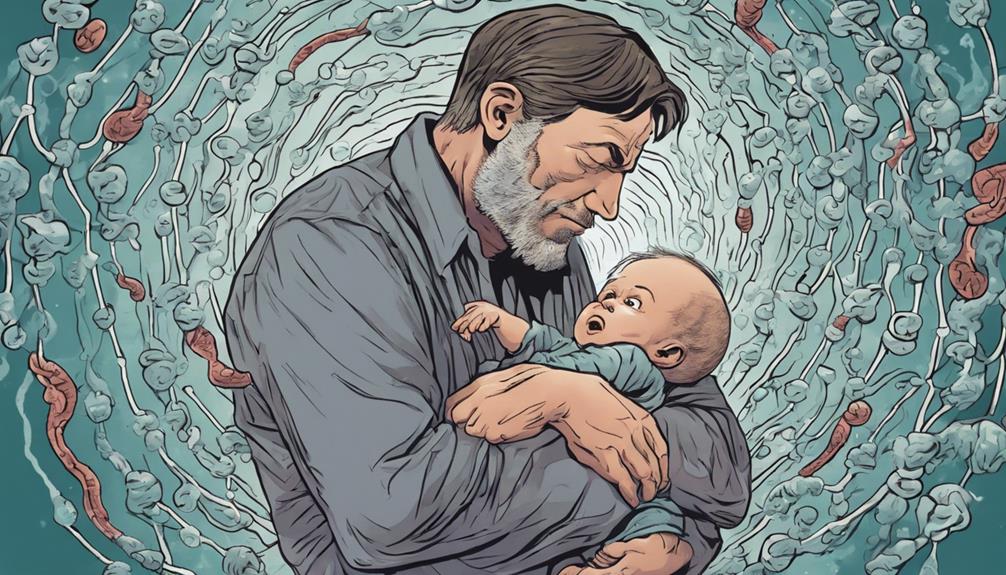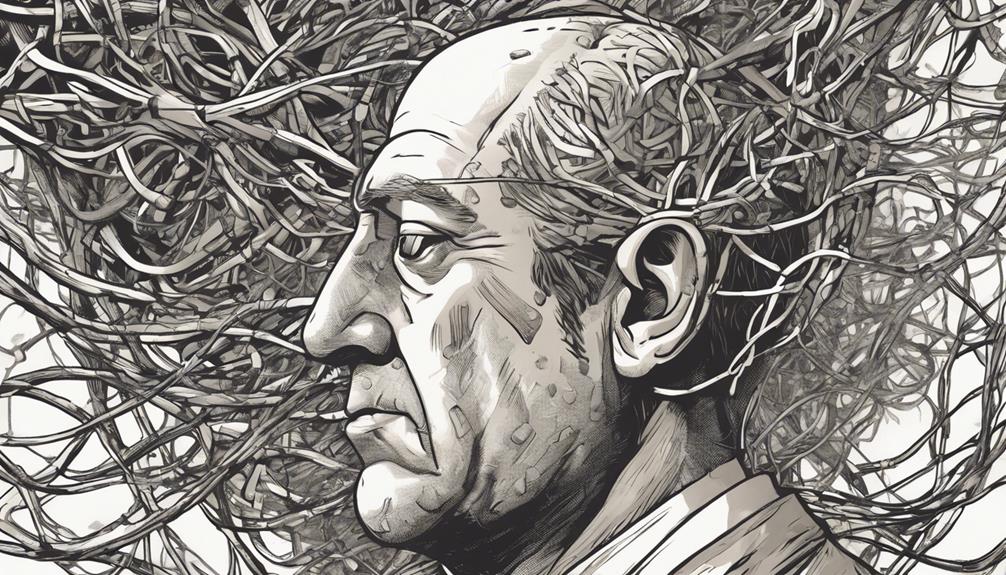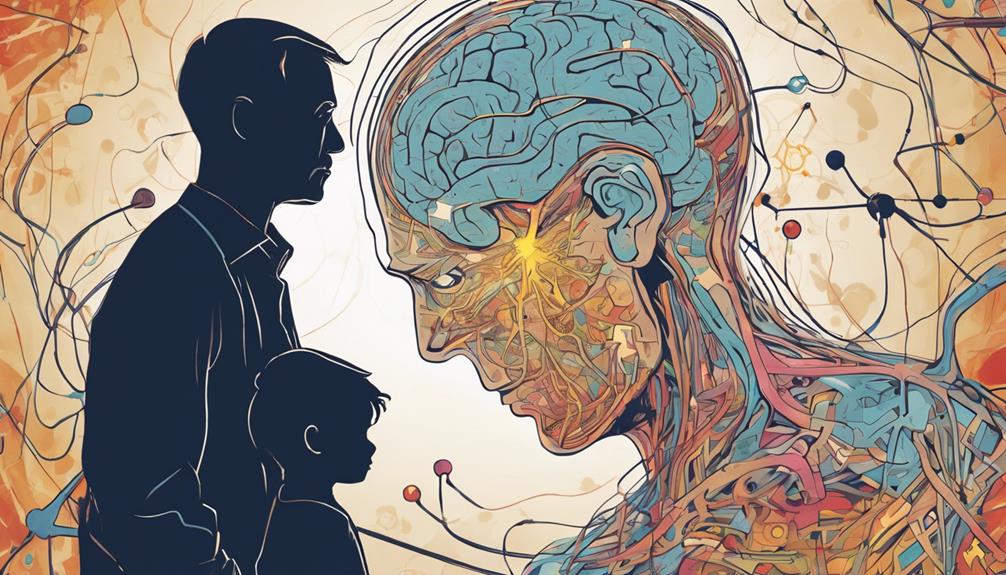Research indicates that paternal stress can affect offspring's brain development through epigenetic changes. Stress in fathers before conception alters sperm, impacting the mental health of future generations. Altered sperm predispose offspring to mental health issues and reduce their ability to handle stress. The intergenerational impact of paternal stress on offspring is becoming more evident. Maintaining fathers' mental well-being pre-conception leads to better outcomes for future generations. These findings emphasize the significance of understanding the enduring effects of paternal stress on offspring health. Understanding this link is vital for promoting healthier outcomes for generations to come.
Key Takeaways
- Paternal stress influences offspring's brain development through epigenetic changes.
- Research on mice shows altered sperm affects future generations' mental health.
- Offspring of stressed fathers are more susceptible to mental health conditions.
- Altered sperm make offspring less capable of coping with stress.
- Understanding paternal stress effects highlights the importance of pre-conception stress management.
Impact of Paternal Stress on Offspring
Through epigenetic changes in DNA, paternal stress has been shown to greatly influence offspring's brain development and mental health outcomes. Research conducted on mice has demonstrated that stress experienced by fathers months before conception can lead to alterations in sperm, potentially impacting the mental health of future generations.
These altered sperm can make offspring more susceptible to mental health conditions and less capable of effectively coping with stress. Consequently, the intergenerational effects of paternal stress on offspring are becoming increasingly evident.
Understanding the influence of paternal stress on offspring's brain development sheds light on the importance of addressing the mental well-being of fathers pre-conception to promote healthier outcomes for future generations.
Epigenetic Changes and Offspring Health

Paternal stress not only influences offspring's brain development but also impacts their health through epigenetic changes in DNA. Research on stressed male mice indicates that epigenetic modifications due to paternal stress can affect offspring health.
Offspring of stressed fathers have been shown to cope less effectively with stress, potentially leading to long-term health consequences. These changes in DNA methylation patterns and gene expression can influence various aspects of offspring health, including susceptibility to mental health conditions and overall well-being.
It is essential to understand the lasting effects of paternal stress on future generations, highlighting the significance of addressing stress management in fathers for the better health outcomes of their children.
Influence of Dads on Child Development

Fathers play an essential role in shaping their children's development through their active involvement and influence on various aspects of their upbringing. Their impact extends beyond just providing for the family; it also influences the child's emotional, social, and cognitive growth.
Here are some ways dads influence child development:
- Educational Attainment: Children close to their dads are more likely to enter college or find stable employment.
- Mental Health and Behavior: Kids with involved fathers are less likely to experience depression or engage in criminal activities.
- Social Skills: Children with active fathers exhibit more sociable and confident behaviors.
Calmer Dads for Healthier Children

Enhancing fathers' emotional well-being can greatly contribute to promoting healthier outcomes in their children's development. Studies suggest that a father's stress levels can impact the health and well-being of their offspring. Epigenetic changes in sperm due to stress can affect how genes are expressed in children, potentially influencing their susceptibility to mental health conditions and ability to cope with stress.
Research on male mice shows that offspring of stressed fathers exhibit less effective stress responses. As a result, supporting fathers in managing stress and promoting their emotional wellness can have significant benefits for the future health and development of their children. By prioritizing the emotional well-being of dads, we can create a foundation for healthier and happier children.
New Pathways for Young Fathers

Exploring innovative avenues to provide resources and support for young fathers is essential in addressing their unique challenges and promoting positive outcomes for both fathers and their children.
Online platforms offering fatherhood education and support groups can connect young dads with valuable information and a community of peers facing similar experiences.
Workshops and seminars focusing on parenting skills, stress management, and financial planning can equip young fathers with practical tools to navigate fatherhood successfully.
Collaborations with healthcare providers to offer specialized services tailored to the needs of young fathers, such as mental health counseling, parental coaching, and early childhood development classes, can enhance their parenting capabilities and overall well-being.
Frequently Asked Questions
Can Stress in Dads During Conception Affect the Gender of Their Offspring?
During conception, paternal stress may not affect the gender of offspring. However, research suggests that stress experienced by dads pre-conception can impact offspring's brain development, mental health susceptibility, and stress coping abilities, highlighting the importance of paternal well-being.
Are There Specific Stress Management Techniques Recommended for Fathers?
Studies show that fathers have a notable influence on child development. Engaged dads positively impact children's mental health and social skills. A key statistic reveals that children close to their fathers are more likely to succeed academically and emotionally, highlighting the importance of paternal involvement.
How Soon After Stress Reduction Can Positive Effects on Offspring Be Seen?
Positive effects on offspring from stress reduction in fathers can potentially be seen in the next generation. Research suggests that improved stress management in dads may lead to healthier offspring, impacting mental health and overall well-being.
Does Paternal Stress Impact Physical Health or Only Mental Health in Offspring?
Paternal stress can impact both the physical and mental health of offspring. Research suggests that stress experienced by fathers can lead to epigenetic changes in sperm, affecting offspring's susceptibility to various health conditions beyond mental health issues.
Are There Genetic Markers That Indicate Susceptibility to Paternal Stress Effects?
In the intricate genetic landscape, markers may reveal vulnerability to paternal stress effects, guiding research toward understanding intergenerational impacts. Revealing these markers could illuminate pathways for intervention strategies to mitigate potential risks and foster healthier outcomes.
Conclusion
To sum up, the impact of paternal stress on offspring's brain development is a significant area of study in the field of epigenetics. The findings suggest that fathers' well-being can have lasting effects on the mental health of future generations.
This intricate interplay between external stressors and hereditary implications serves as a powerful reminder of the enduring influence fathers have on their children's well-being.
Just as a stone creates ripples in a pond, paternal stress can shape the future health outcomes of offspring.










